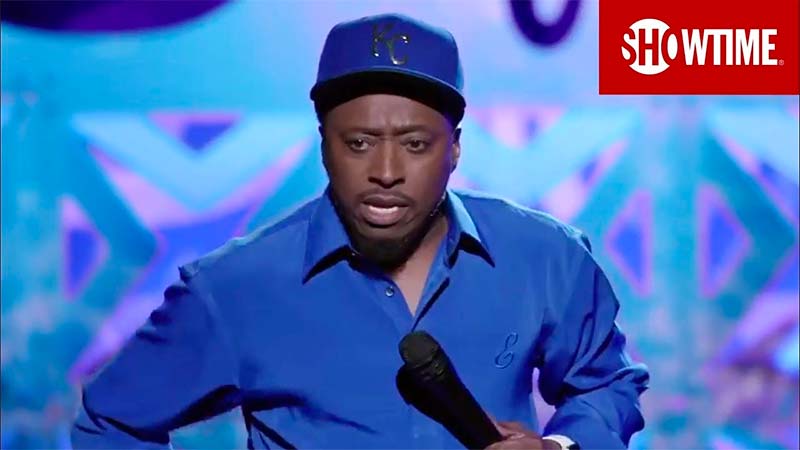
As a humorist who focuses predominantly on African American male comedians, it is quite likely that I have reached my saturation point. It is no surprise considering that I spend my days and nights (re)watching the works of contemporary greats like Paul Mooney, Eddie Murphy, Dave Chappelle, and Chris Rock. I mention all this to articulate my mood prior to watching and reviewing Eddie Griffin’s latest stand-up Undeniable. According to Griffin’s closing remarks, my offense marks me as a bougie person. If being unable to overlook the problematics of some his jokes, while appreciating the others makes be bougie–a term I would not use to describe myself–then I suppose I am guilty as charged.
In this special, Griffin uses an unapologetically black delivery and tone to posit hurricanes as “nigga spirits,” Melania Trump as Putin’s highest ranking KGB spy, and Trump as the Orange Avenger–superhero to the poor whites. Griffin throws caution to the wind and speaks truth to power using these original, creative claims to do his part to challenge the white supremacist nation-state. It is this dipping in and out of colorful examples, like the complaints of a white slave picking cotton under the Griffin administration, to direct declarations–e.g. telling white people to get over themselves as they possess an “innate ability to be racist, and think everybody is supposed to deal with their s**t.” These moments of such biting and innovative observations about American life and white supremacy that punctuates Griffin’s style of “not mixing words.” It is also these moments, where he calls out white people for white peopling that resonate the most with me. Unfortunately, this direct engagement with racist practices become overshadowed by unrevised play with racist and sexist stereotypes and problematic patriotism that the bulk of his jokes rely on.
Like his predecessors and contemporaries, Griffin uses women to justify his performance of an inflated male ego. Similar to Katt Williams, in his praisesong to the Obama administration, Griffin laudes Michelle Obama as the first “ass” in the White House. Unsurprisingly and quite unimaginatively, Michelle is often reduced to her ass or her degrees. He then uses her to launch into an entire bit about the power of pussy, continuing to reduce women to body parts, and highlighting their purpose as being for male pleasure. He attempts to reverse this technique by stating that women don’t care about men, but about their dick, and explores the concept of a detachable penis. In the world of this joke, the man’s pool game is interrupted by pleasurable sensations as he can feel his wife and her friend at home playing with his dick. This idea is then followed by the metaphorical, volunteered dismemberment of a woman prior to a girls night out whereby she removes her ass, vagina, lips, right hand, breasts, and feet before heading out to party. This bit does not do the work, Griffin intends. It does not serve as absurd example of the relational practices or the reduction to human interaction as sex. Rather, it feels like a testament to the rhetorical violence done to women, where thinly veiled sexist aphorisms created to stroke the male ego, are passed off as jokes. This bit also acts as a less complicated version of Wanda Sykes’ Detachable Pussy from her 2006 Sick and Tired.
In addition to semi-latent sexism, also present in his performance is good ol’ American imperialism. In the same breath, Griffin supports immigrants’ rights in the nation and undermines their struggles by stating, “when white people f**k with Mexicans, they can go home.” Whereas, according to the comedian, it is impossible for African Americans to simply walk back to the motherland. This false equivalent is not only reductive, but it creates an unnecessary hierarchy that mirrors the same one created by the white majority that places black persons as the bottom. The extent of his Americanity blossomed when he talks about black excellence in the sport of running. Despite delicately towing the line with the backstory of how chasing gazelle for weeks at a time produced the endurance of Ethiopian marathon runners, he crosses a line when he calls them eggheads. Not only is it offensive, but it does nothing to enhance the joke and feels somewhat aligned to the same critique he gives of white Americans.
Again, as a humorist, I know that the art form I enjoy comes with its own qualms. I can appreciate Griffin’s insight to American culture and his straight-for-the-jugular style of delivery. In fact, being a black woman in a predominately white working place, where I have to meter my response to account for the potential of white tears, it is relieving to hear someone speak so frankly to white folks about their Caucasity. However, it is becoming harder to enjoy these aspects when it is intertwined with problematic perspectives on gender and nationality; according to Griffin, my inability to overlook the problematics, makes me bougie. As we see on Griffin’s stage, which looks no different than most, black men have big dicks, women are walking pussies, and African Americans are superior negroes.








